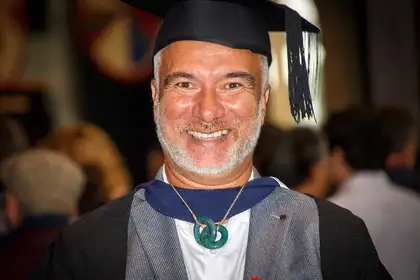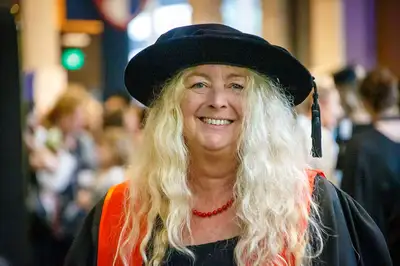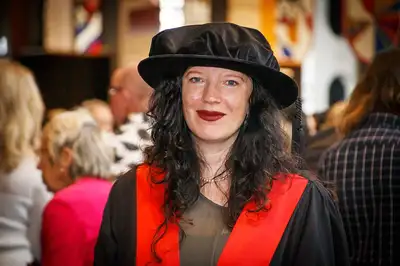
Associate Professor Warren Maxwell at the Wellington graduation on April 20.
Two Massey staff members were conferred with doctoral degrees and one with a Master’s at the Wellington graduation ceremonies last week.
Bringing the sounds of nature to life
Associate Professor and musician Warren Maxwell, Ngāti Whare, Ngāi Te Riu, Ngāti Rākaipaaka, Ngāi Tūkairangi, graduated with first class honours in a Master of Fine Arts (MFA).
Associate Professor Maxwell, who teaches music performance at Te Rewa o Puanga School of Music and Creative Media Production, says he was inspired to take up his Master’s after feeling a “little stale” with his own music practice, and needed a spark.
“I have had a great music career to date, but I felt like I was in a bit of a 'dead-zone' creatively. The MFA experience (with the assistance of my amazing lecturers and mentors) was super-inspiring and has opened my eyes to all sorts of potentials. I now comprehend that there are infinite nuanced potentials - you just need to be given the 'keys’.”
His research was formed around the objective of re-connecting himself and the community to our natural world using music composition as the main medium, along with other media to support that connection. “For example, I used video and inter-active performative experiences to cement audiences temporal, physical connection with place. I also employed local narratives to further solidify participants connection to the place and the moment.
“The narratives used were based on stories of peace in the Wairarapa where I live. I had a lot of support from mana whenua, the local community and also South Wairarapa District Council.”
One of the projects involved transforming the remains of a fallen totara tree found at Wairarapa Moana and turning it into a musical instrument. He stretched strings to a section and fixed stereo contact mics linking to an effects pedal and PA system. The result was “an eerily sound of murmurs and vibrations that helped to unlock some of the mystery of this once magnificent tree and the land it stood in.”
He says he is really relieved to have completed this substantial course of study. “The research was lots of fun! I think that’s the key - you’ve got to find a research subject that really excites and resonates with you, then it becomes fun. I’m really happy to have finished my MFA but there is still a lot more I’m wanting to explore.”

Dr Fran Tyler at her graduation on April 20.
When crime (reporting) does pay
A career in crime reporting led School of Communication, Journalism and Marketing tutor Fran Tyler to undertake a PhD investigating how media coverage of a crime may affect audience understanding of the event, the perpetrator and the victim.
Dr Tyler, who teaches papers in politics and journalism and media law and ethics, looked at colonial and post-colonial media reporting between 1870 and 1930 and how journalists named and framed those involved in multiple-child murders. She also analysed the evolution of New Zealand’s name suppression laws and how these affected crime reporting.
“I chose multiple child murders because I needed quite a small group to study. I looked at the way the media described them in news reports and whether that language had the potential to be prejudicial, to make them look guilty or innocent.”
She found that media gave a greater profile to the accused killers over their victims, and that potentially prejudicial words were often used to create combinations of ‘mad’, ‘bad’ and ‘sad’ frames for the accused killers.
“There are really observable patterns from that 1870-1930 period that I still see in modern reporting, where the media tend to put people into categories where they clearly must be insane, or evil, or we have a degree of sympathy for them, and we still as journalists do that. It's still a risky area when you're writing about someone who's going to be facing murder charges in court –a jury might take that and decide they're a nasty person and find them guilty.”
She hopes her research can inform the unofficial “rules” around how journalism is conducted. “A lot of modern newsroom practice is based on the way things were done years ago. Media has such an important role in shaping public opinion and if we're doing something that's perhaps not quite right, then we need to examine that and say can we do it a little bit differently.”
Dr Tyler has been in crime reporting since her mid-20s, first working as a court reporter at The Dominion newspaper and as an investigative crime reporter at The Dominion Post and Stuff. Her academic career began with a Master of Journalism with Distinction, which looked at lobbyists working in politics and the relationship between them and journalists.
Her research has been beneficial to her personal life, through the genealogy investigation business she runs with a former colleague. They work for law firms to help identify and locate beneficiaries of deceased estates, and help adopted people locate their birth families.
“A lot of the job is journalism skills and using the research skills learnt while doing research into historical crime. I've got to learn a lot about how to navigate those old historical databases and records you actually have to go places to look at.”
They also run a blog which features a twice-weekly write up of a historical crime story. “It's also related to my research skills, going back and finding these fascinating stories and telling these stories that people have forgotten about otherwise.”
She highlights the value of historical records website Papers Past, which she recommends for anyone else doing historical research because it is so valuable.
Dr Tyler credits her husband’s support with the fact she completed her doctorate during a time of personal upheaval, including the death of her mother and both of her parents-in-law. “If you are contemplating doing a PhD, it's a huge investment and you really need to have a supportive environment around you, it's not something you can just launch into. I was so lucky to have an incredibly supportive husband.”

Dr Jess Richards at her graduation on April 20.
When performance art meets creative writing
Fusing a writing career with a background in performance art is the basis for Jess Richards’ creative practice PhD, which she describes as a “hybrid art project” bridging the gap between fine art and creative writing.
The author and creative writing tutor at the School of Humanities undertook her PhD through the College of Creative Arts (CoCA), with two supervisors who matched the dual nature of her doctorate; artist and sculptor Professor Kingsley Baird and writer Dr Thom Conroy.
Her research project incorporated artistic practices such as installations, performative processes, performance art, and making artefacts. She incorporated artistic processes into the practice of fiction writing, and her final examined work was a suitcase of altered books, which were one-off artefacts/objects.
“They were simultaneously pieces of fiction writing and creative objects which could be engaged with in a performative way. The examiners received a suitcase of books in their homes – these books were all one-off handmade objects which they had to spend time reading.”
In the early 1990s Dr Richards went to Dartington College of Arts in the UK, where she studied visual performance. Much later, in 2008, she learned about fiction writing on a part-time community course at Sussex University. “For my PhD I wanted to bring these two things together, fine arts and fiction writing. I explored what happened in that gap between them.
“The altered books that I've made provide a unique reading experience. Reading becomes an inventive experience which will be different for each reader as they seek to find meanings through the layers of text in the books.”
Dr Richards, who is the author of three literary fiction novels, tested her books in various spaces at Massey and showed them as an installation at a conference at the University of Otago, as a “reading room”. She says she would have loved to exhibit them, but Covid-19 restrictions last year prevented it. “I couldn't set up a space where one individual after another could sit and handle books. They are tactile objects which need to be touched and looked at closely. But at some stage in the future I would like to exhibit them as a reading room installation where individual readers can spend quiet time alone with the books.”
She received a Massey University Doctoral Scholarship which enabled her to take on the PhD. “I’m hugely grateful to the Graduate Research School and CoCA for this opportunity. It's been an absolute honour and privilege to work with my talented supervisors. To have that regular contact and thoughtful input from my supervisors, who guided me gently through the whole thing has been like a dream. I would have liked it to continue for at least ten more years!”
She says the experience of doing a PhD during Covid-19 was challenging. She has not seen her family for two and half years outside of Skype, and a planned trip to the UK to visit them last year with her wife, author Sally Morgan, had to be cancelled. “It's really hard being so far away from our relatives, and still not knowing when we’ll see them again.”
She’s currently balancing her work for Massey with teaching creative writing and editing courses at the Wellington High School Community Education Centre, mentoring other writers, and working on her own creative writing. “Something that came out of doing the PhD is some new non-fiction poetic writing. I can’t say too much about it yet, but it’s circling around themes of ghosts and birds, grief and love.”